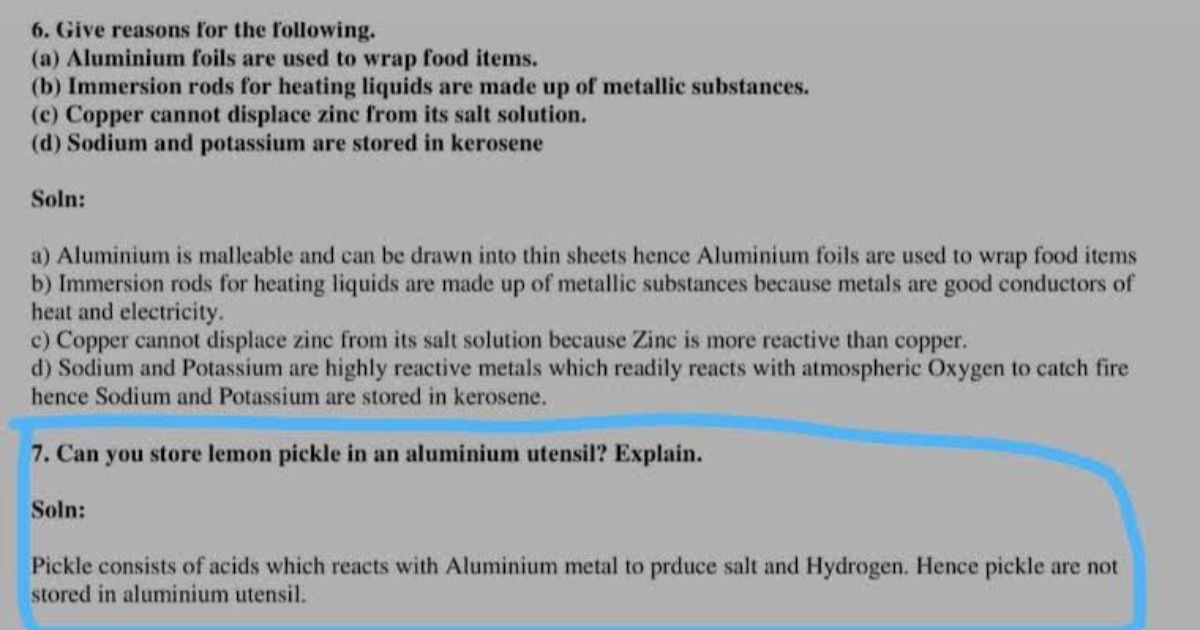Pickles are an essential part of many cuisines around the world, adding flavor, spice, and a touch of tradition to meals. Among all pickles, lemon pickle is particularly popular for its tangy and spicy taste. However, when it comes to storing pickles, the choice of container becomes crucial because of the chemical nature of the ingredients involved. A common question arises: Can you store lemon pickle in an aluminium utensil explain?
Let’s explore this topic deeply, looking at the science, tradition, and practical implications behind the correct storage of lemon pickle.
Understanding the Nature of Lemon Pickle
Before answering “Can you store lemon pickle in an aluminium utensil explain,” it’s important to understand the nature of lemon pickle itself.
Lemon pickle typically contains:
- Fresh lemons
- Salt
- Spices (like chili powder, turmeric, fenugreek)
- Oil (mustard oil or sesame oil)
- Sometimes vinegar
These ingredients are rich in acids, particularly citric acid from lemons, along with salt and other reactive compounds. The high acidity is critical for the preservation and taste of the pickle.
The combination of salt, acid, and sometimes heat (from spices) makes pickles chemically reactive.
Properties of Aluminium as a Material
Aluminium is a lightweight, soft, and ductile metal known for its good conductivity and resistance to corrosion under certain conditions. However, it has specific chemical properties that must be considered:
- Highly reactive with acids: Aluminium reacts with acidic substances to form salts and release hydrogen gas.
- Formation of Aluminium Salts: When aluminium comes in contact with acids like citric acid, aluminium salts may be produced.
- Toxicity Concerns: Aluminium salts are not considered healthy for regular consumption, as excessive intake can affect human health.
- Durability: Prolonged exposure to acids can corrode aluminium, weakening the container and leading to contamination.
Can You Store Lemon Pickle in an Aluminium Utensil?
The direct and clear answer is No, you should not store lemon pickle in an aluminium utensil.
Now let’s explain why in detail.
Scientific Explanation
1. Chemical Reaction with Acid
When lemon pickle, rich in citric acid, comes into contact with aluminium, a chemical reaction takes place:
Citric Acid + Aluminium → Aluminium Citrate + Hydrogen Gas
This reaction causes:
- Formation of harmful aluminium salts (such as aluminium citrate)
- Possible contamination of the food
- Weakening of the aluminium utensil
- Change in taste, smell, and color of the pickle
2. Health Hazards
Consuming pickle contaminated with aluminium salts can be harmful:
- Aluminium has been linked to neurological disorders when accumulated in the body.
- It may contribute to diseases like Alzheimer’s (though research is ongoing).
- Regular ingestion of aluminium compounds can burden the kidneys.
Thus, health agencies advise minimizing exposure to aluminium from food.
3. Loss of Pickle Quality
Storing lemon pickle in an aluminium utensil can:
- Turn the pickle metallic in taste
- Alter the natural flavor of spices
- Discolor the pickle (may turn greyish or dull)
- Reduce shelf-life due to ongoing chemical reactions
Thus, both the quality and safety of the pickle are compromised.
Traditional Knowledge
Traditionally, pickles in India and other parts of the world were always stored in:
- Glass jars
- Ceramic or clay pots
- Food-grade plastic containers
- Stainless steel containers
Our ancestors understood, even without modern chemistry, that reactive metals like aluminium or copper should be avoided for storing acidic foods.
Preferred Materials for Storing Lemon Pickle
If aluminium is not suitable, then what materials should you use?
1. Glass Jars
- Inert: Does not react with acids.
- Transparent: Easy to see the pickle’s condition.
- Easy to Clean: Can be sterilized easily.
2. Ceramic Pots
- Non-reactive: Safe for long-term storage.
- Traditional Aesthetic: Adds charm to homemade pickles.
- Maintains Moisture: Keeps pickles juicy without drying.
3. Stainless Steel
- Relatively Safe: High-grade stainless steel (like 304 or 316) is resistant to corrosion.
- Durable: Long-lasting and strong.
4. Food-Grade Plastic
- Modern Convenience: Lightweight and unbreakable.
- Non-reactive if certified: Only use plastics that are labeled food-safe.
Thus, lemon pickle should be stored in non-reactive containers for safety and quality.
Experimental Proof
If you still doubt whether aluminium reacts with lemon pickle, you can perform a simple experiment:
- Take a small piece of aluminium foil.
- Drop some lemon juice mixed with salt onto it.
- Observe after a few minutes.
You’ll notice bubbles (hydrogen gas) and the foil slowly getting corroded. This demonstrates why aluminium and acidic foods don’t go well together.
Common Mistakes People Make
Many households unknowingly make the following mistakes:
- Using aluminium vessels because they are cheaper and readily available.
- Storing pickles temporarily in aluminium bowls after preparation.
- Assuming that ‘short-term storage’ won’t cause any harm.
Even short exposure can lead to chemical reactions and spoilage. Thus, it’s best to avoid aluminium completely for pickles.
What About Anodized Aluminium?
Anodized aluminium has an oxide layer that protects it from corrosion.
However:
- If the anodized layer gets scratched, the underlying metal can react with acids.
- Over time, even anodized aluminium is not recommended for acidic food storage.
Thus, even anodized aluminium should not be trusted fully for storing lemon pickle.
Tips for Safe Pickle Storage
Here are some expert tips:
- Always sterilize glass jars before use.
- Ensure the pickle is fully submerged in oil if the recipe demands it — this acts as a natural preservative.
- Keep the jars in a cool, dry, and dark place.
- Use a clean, dry spoon every time you take pickle out to avoid contamination.
- Avoid moisture entering the pickle jar, as it can cause fungal growth.
Following these simple practices ensures your lemon pickle remains tasty and safe for months or even years.
Conclusion
Can you store lemon pickle in an aluminium utensil explain?
The final answer is a resounding NO.
Storing lemon pickle in an aluminium utensil is unsafe because:
- It leads to a chemical reaction forming harmful aluminium salts.
- It spoils the flavor, color, and safety of the pickle.
- It can pose serious health risks upon consumption.
Instead, use non-reactive materials like glass, ceramic, stainless steel, or food-grade plastic containers for storing lemon pickle.
Being aware of these small yet important details not only protects your health but also preserves the traditional goodness of homemade pickles for you and your family to enjoy.










